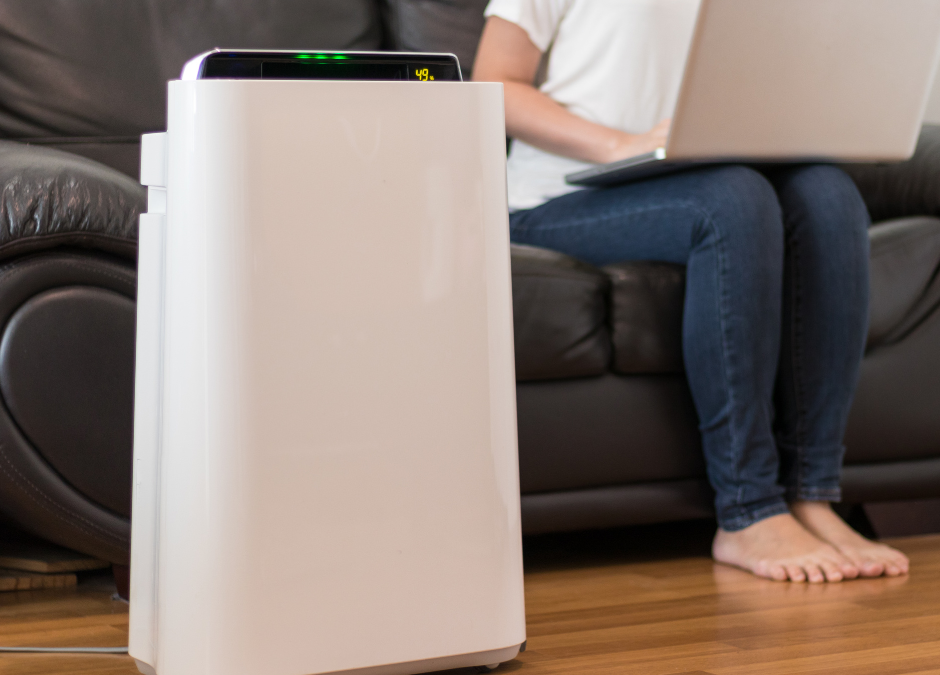As we prepare for the coming cold season, we stop opening our windows and doors and this can greatly impact the air that you breathe inside your home. It may surprise you to learn that EPA reports show indoor air pollution somewhere between 2 to 5 times worse than outdoor air. This is because the air inside is trapped and it mixes with chemicals that are in our homes. Think about cooking fumes, hair spray, airborne particles from coughs and sneezes, pet dander, and cleaning products. Those (and many others) send particles into the air, which are then recycled throughout your home. Opening the windows allows fresh air to come in and dilute the indoor air. However, once we turn on the heat during the fall and winter, we don’t want to let the heat escape by opening a window. In order to improve air quality over the colder months, follows these quick tips:
- Regular Maintenance – the air you breathe in your home cycles through your HVAC system. The best tip for overall HVAC health is to have regular maintenance done twice a year – once in the fall before turning on the heat, and once in the spring, before switching over to air conditioning. It helps to ensure that the HVAC system is running smoothly and efficiently. It also improves the air quality by tidying things up and making sure there aren’t any problems. These systems tend to have pollutants build up over time, but regular maintenance will reduce the amount that makes it into the air you are breathing.
- Filter – the easiest thing you can do to improve the air quality in your home is to regularly change the filter in the HVAC system. It is easy and quick and you can do it yourself. Filters that are left too long become clogged with debris, which means the HVAC has to work harder to push air through, and pollutants are probably slipping through, into the air you breathe. If you aren’t sure what to do, ask your HVAC specialist during your next maintenance visit. Most filters need to be changed every 3 months. You can upgrade to a higher-quality filter if you have a loved one with respiratory issues but basic filters will take care of things like pollen, dander, and dust. If you have trouble remembering when to change the filter, sign up for automatic delivery. That way, when the filter is delivered, you know it is time for a replacement.
- Humidity – keeping the humidity level low in your home is also a way you can improve indoor air quality. Humid, damp air is ideal for mold and mildew to grow. By keeping the humidity between 30 and 50% you can reduce the chances of having a mold or mildew problem. When they start to grow, they release spores into the air that can make you sick. Talk to your HVAC specialist to learn the best way to maintain the desired humidity level in your home. If your current HVAC system isn’t great at maintaining humidity, you can help it out by purchasing a dehumidifier.
- Air Purifier – these are great products that can help to greatly improve the air quality in your home. However, you have to implement them properly in order for them to make a difference. Just having a purifier in your bedroom may seem like a great idea, because that’s usually where you spend a significant amount of time when you’re home. However, that’s not actually true. It’s impossible to prevent air from leaking from one room to another. So the air in the bedroom is actually constantly cycling throughout the house. If you only have one purifier, it will become overwhelmed and be unable to make a difference in the air quality. You need to install multiple air purifiers throughout your home or look into purchasing a whole-house air purifier. Look carefully, because most purifiers are rated for a specific amount of square footage. If you opt for air purifiers, you should still implement these tips to help reduce the number of irritants that are in your home.
- Door Mats and Floors – Most of the dust, pollution, and irritants that make their way indoors come through and collect on the floors of your home. The best way to combat that is to have a heavy-duty doormat out front. This helps keep things outside, rather than being tracked into your home. The second line of defense is consistent vacuuming and mopping. All the particles floating in your home will eventually settle on the floor. If you are able to vacuum and mop regularly, this removes the irritants and reduces the number of particles that are in your home.
Keeping the air inside your home clean is underrated. You may live with someone who has respiratory issues, someone who is very old, or very young, or you may just want to improve your own overall health. Regardless of the reason, improving indoor air quality is something that isn’t too complicated or expensive, and most of these tips are things you can do on your own. Spending the winter indoors breathing in pollutants is not ideal, so let’s make a plan to improve air quality. Get in touch with Reliance Home Comfort today!

